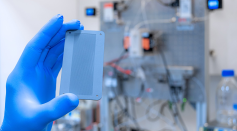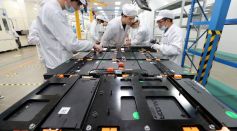TECH & INNOVATION

Smartphone Sensors Could Accurately Foresee Users' Five-Year Mortality Risk

Greenhouse Gasses Such as CO2 Could Transform Into Production of Raw Material Using Nanodiamonds

Air Pollution Can Now Make Fuel, Plastic, Dresses Through Alcohol's Help [Study]

Lithium-Ion Batteries Burn More Than 700 Bin Lorries, Recycling Centers; Here’s Why!
After Teaching AI Chatbot Based on Childhood Diaries, Woman Talks to "Inner Child" Bot

Plant Cell’s Nanobodies Can Now Block Certain Pathogens [Study]

South Australian Geologist Digs Deep to 600-Million-Year-Old Flinders Ranges Through Virtual Reality

Lifelike Holograms More Feasible Thanks To Beam Forming Kit

Elon Musk’s Neuralink Hopes to Start Implant Trials on Humans Within Half a Year

Cell Chemistry Evolution Might Unlock Electrolytes Development Inside Na- and Li-ion Battery Cells [Study]

Dogs Prefer Electric Vehicles Over Diesel Cars as It Offers Smoother Ride That Calms Them Down

'Al Rihla' Footballs Are the Most High-tech Ever Used in the World Cup as They Need To Be Charged Before the Games

What the Human Race Could Look Like if We Last a Million More Years

Robots Can Replicate Work, May Possibly Replace Humans For Jobs
Most Popular

Water Shortage Crisis: Are We Running Out of Fresh Water? Global Data Reveals the Truth

10 Reasons Mars Stands Out as the Top Planet for Human Colonization and Long-Term Survival in Space

Brain-Computer Interfaces: How Humans Could Control Machines and Devices Using Thoughts

Climate Technology in 2026: How Carbon Capture is Fighting Environmental Damage





